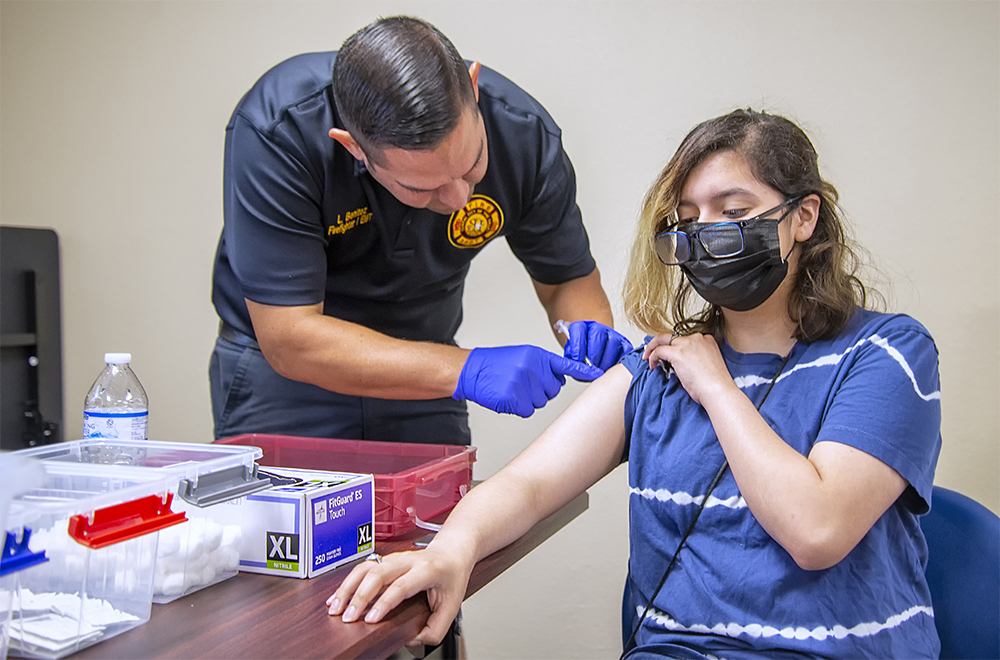HARLINGEN — The city’s COVID-19 vaccination program is launching its second phase, administering its first booster shots as the delta variant drives infections to levels recorded at the pandemic’s height here last summer.
Last week, the city’s program began administering booster shots to residents with weakened immune systems, Josh Ramirez, the city’s health director, said Thursday.
On Sept. 20, federal and state health officials are expected to open the booster program to people 12 and older, he said.
“We’ve had calls — when they can get the (boosters) and where they can get it,” Ramirez said.
Now, state officials are finalizing the boosters’ administration schedule, he said, adding he expects health care workers and first responders to be among the first on the list as a result of their contact with infected residents.
“Our goal is to try to get boosters to immune-compromised patients including the elderly at nursing homes and then work toward the general population,” he said.
The COVID-19 booster shot
The booster shots are single-shot doses of the COVID-19 vaccine designed to boost protection as the vaccine’s anti-bodies begin to wane, Ramirez said.
“It’s the same vaccine, the same product, the same dosage,” he said.
Vaccination cards, which include the COVID-19 vaccine’s manufacturer, such as Pfizer, Moderna and Johnson & Johnson, will determine the booster brand people will receive, Ramirez said.
Meanwhile, federal officials are planning to cut the interval between the administration of the COVID-19 vaccine and the booster from eight to six months for people with healthy immune systems.
Now, federal protocols are cutting the vaccine and booster intervals for people with weaker immune systems, he said.
“For someone who is healthy, the vaccine can last longer because your immune system is stronger — the vaccine could protect you for a year or more,” he said. “Some of the studies show some patients may need the boosters sooner — immune compromised patients.”
Federal health officials haven’t determined whether more booster shots will follow, he said.
Last week, Raymondville Mayor Gilbert Gonzales and Lyford City Commissioner Albert Cavazos became some of the area’s first residents to get their booster shots.
“We were guinea pigs,” Cavazos, 63, said with a chuckle.
In Lyford, state health officials gave the two politicos their booster shots at Albert’s Food Pantry and Referral, a city-owned pantry that’s become the site of state vaccination clinics every Monday.
Health officials gave them the booster shots because they’re both heart patients, Cavazos said.
“I needed it,” he said. “By the grace of God I’m here — and I want to live a little bit longer.”
Gonzales said he wants more residents to know about the booster shots.
“People don’t know it’s available,” Gonzales, 68, said. “I feel great about it. It will help a lot of people — especially those with weaker immune systems.”
$2 million program expansion
In Harlingen, Ramirez is planning to launch community vaccination clinics administering the booster shots after federal officials open the program to the public after Sept. 20.
Meanwhile, he plans to open satellite vaccination sites while driving a mobile clinic into the community.
“We’re going to have the ability and flexibility to provide the vaccine to the community,” he said.
So far this year, state health officials have awarded the city $2 million to expand its vaccination program while aiming to boost the vaccination rate that stands at more than 70 percent — one of the state’s highest.
Earlier this month, state officials gave the city a $600,000 grant which Ramirez plans to use to hire two full-time and four part-time nurses to help administer the vaccines, monitor COVID-19 cases and work to better educate the public on the vaccine.
Out of his staff, a nurse will work with the Harlingen school district to administer the vaccine while educating students, parents and teachers on the vaccine, he said.
In April, state officials awarded the city a $1.4 million grant.
With the grant, he’s setting aside $400,834 to hire personnel, including a nurse, a community outreach coordinator and a secretary, Ramirez said.
Meanwhile, officials are tapping $201,086 to purchase a pharmaceutical refrigerator and freezer in which to store the vaccine along with a portable refrigerator to transport doses as part of the mobile clinic, he said.





